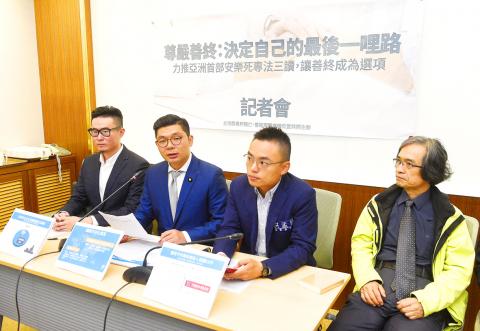Chinese Nationalist Party (KMT) Legislator Jason Hsu (許毓仁) yesterday unveiled a “dignified end of life” bill, which would be Asia’s first special act on euthanasia if passed.
A survey conducted by the Directorate-General of Budget, Accounting and Statistics found that Taiwanese spend an average of 8.8 years living in poor health, while the Ministry of the Interior forecast that the nation’s elderly population would exceed 2 million people in a decade, Hsu told a news conference in Taipei.
Euthanasia has gained the support of the majority of society in the past few years, Hsu said, citing a survey conducted by his office, which found that 98 percent of the more than 2,000 people interviewed supported legalizing euthanasia on the conditions that applicants are required to go through an elaborate review procedure and that there are sufficient accompanying measures.

Photo: Chen Chih-chu, Taipei Times
Meanwhile, euthanasia has gained support in several countries and regions, he said.
The Netherlands, Belgium, Luxembourg, Colombia, Canada and Victoria, Australia, have legalized physician-assisted suicide and voluntary active euthanasia, while Switzerland, Finland, Austria, Germany and nine US states have legalized physician-assisted suicide, he added.
The bill would require a euthanasia applicant to fulfill several conditions, Hsu said.
First, they must have an incurable disease and be experiencing intolerable pain, he said, adding that both the physician and the patient must agree that there are no reasonable alternatives to euthanasia.
Second, the patient must file three applications and pass a final review, he said.
Third, the patient must have undergone evaluations by a professional medical team, he added.
A “dignified end of life” committee should be established to conduct reviews before and after euthanasia is administered, Hsu said.
Physicians should be given the right to refuse to perform euthanasia, he added.
“We cannot decide how we come into this world, but I believe that we should be able to decide how to walk the last mile,” Hsu said.
The bill has advanced to committee review and he hopes that it would pass a third reading before the end of the current legislative session, Hsu said, calling for nonpartisan support from fellow lawmakers.
Fu Chun-hao (傅俊豪) said his father, Fu Da-ren (傅達仁), a celebrated sports anchor, had to visit Switzerland twice before he underwent euthanasia last year, as it is not allowed in Taiwan.
“It was not a regrettable, sad or horrific scene, but a painless and warm one,” Fu Chun-hao said. “Surrounded by his family, [my father] drank a cup of medicine, fell asleep in three minutes and stopped breathing 30 seconds later.”
Fu Da-ren had spent his life’s savings, totaling more than NT$3 million (US$98,428), in his battle with cancer, which lasted more than two years, Fu Chun-hao said, adding that his father wanted to use his example to raise public awareness of the importance of legalizing euthanasia.
Fu Chun-hao thanked Hsu for sponsoring the bill, which would give a person in pain the choice of undergoing review.
He expressed hope that lawmakers would act in a nonpartisan manner and clear the bill through the legislative floor with a third reading.

Three Taiwanese airlines have prohibited passengers from packing Bluetooth earbuds and their charger cases in checked luggage. EVA Air and Uni Air said that Bluetooth earbuds and charger cases are categorized as portable electronic devices, which should be switched off if they are placed in checked luggage based on international aviation safety regulations. They must not be in standby or sleep mode. However, as charging would continue when earbuds are placed in the charger cases, which would contravene international aviation regulations, their cases must be carried as hand luggage, they said. Tigerair Taiwan said that earbud charger cases are equipped

UNILATERAL MOVES: Officials have raised concerns that Beijing could try to exert economic control over Kinmen in a key development plan next year The Civil Aviation Administration (CAA) yesterday said that China has so far failed to provide any information about a new airport expected to open next year that is less than 10km from a Taiwanese airport, raising flight safety concerns. Xiamen Xiangan International Airport is only about 3km at its closest point from the islands in Kinmen County — the scene of on-off fighting during the Cold War — and construction work can be seen and heard clearly from the Taiwan side. In a written statement sent to Reuters, the CAA said that airports close to each other need detailed advanced

Tropical Storm Fung-Wong would likely strengthen into a typhoon later today as it continues moving westward across the Pacific before heading in Taiwan’s direction next week, the Central Weather Administration (CWA) said. As of 8am, Fung-Wong was about 2,190km east-southeast of Cape Oluanpi (鵝鑾鼻), Taiwan’s southernmost point, moving westward at 25kph and possibly accelerating to 31kph, CWA data showed. The tropical storm is currently over waters east of the Philippines and still far from Taiwan, CWA forecaster Tseng Chao-cheng (曾昭誠) said, adding that it could likely strengthen into a typhoon later in the day. It is forecast to reach the South China Sea

WEATHER Typhoon forming: CWA A tropical depression is expected to form into a typhoon as early as today, the Central Weather Administration (CWA) said yesterday, adding that the storm’s path remains uncertain. Before the weekend, it would move toward the Philippines, the agency said. Some time around Monday next week, it might reach a turning point, either veering north toward waters east of Taiwan or continuing westward across the Philippines, the CWA said. Meanwhile, the eye of Typhoon Kalmaegi was 1,310km south-southeast of Oluanpi (鵝鑾鼻), Taiwan’s southernmost point, as of 2am yesterday, it said. The storm is forecast to move through central